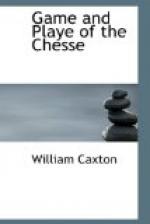The readers of “Cymbeline” will remember the passage in the concluding scene:—
“The piece of tender
air, thy virtuous daughter,
Which we call mollis aer;
and mollis aer
We term it mulier;
which mulier, I divine,
Is this most constant wife:
who even now,
Answering the letter of the
oracle,
Unknown to you unsought, were
clipp’d about
With this most tender air.”
This quaint piece of etymology will be found at p. 123 of the present volume.
There is an interesting personal reference in the following passage which has not, it is believed, been pointed out:—
“And also hit is to be supposyd that suche as haue theyr goodes comune & not propre is most acceptable to god/ For ellys wold not thise religious men as monkes freris chanons obseruantes & all other auowe hem & kepe the wilfull pouerte that they ben professid too/ For in trouth I haue my self ben conuersant in a religious hous of white freris at gaunt Which haue all thynge in comyn amonge them/ and not one richer than an other/ in so moche that yf a man gaf to a frere .iii.d or iiii.d to praye for hym in his masse/ as sone as the masse is doon he deliuerith hit to his ouerest or procuratour in whyche hows ben many vertuous and deuoute freris And yf that lyf were not the beste and the most holiest/ holy church wold neuer suffre hit in religion.”
This description by the busy merchant of the “best life” might serve to point anew the distinction between the real and the ideal, and perhaps not to the advantage of the latter.
Nothing has yet been said as to the place of this book in the history of chess, and, indeed, it must be confessed that it has very little practical bearing on the game. The learned dreams by which the chess of to-day was connected with the latrunculi and with the amusement said to have been invented by Palamedes, have been dissipated by the cool air of modern criticism. The student of the history of chess may now follow its fortunes under the safe guidance of Dr. van der Linde, who rejects unhesitatingly the claim made for it, and admitted even by Forbes, of an antiquity of 5,000 years.[41] The game of chess, which, whilst remaining an amusement, has acquired the dignity of a science, is one that Europe owes to India, where it was probably invented not earlier than five centuries before Christ; the triumphant progress of Islam aided in the extension of this oriental pastime. It was known at the courts of Nicephorus at Conftantinople and his contemporary Haroun-al-Rashid at Bagdad. One would like to add that Charlemagne also was acquainted with it, but there is no good evidence for that legend. It was known in Spain in the tenth century, since the library of the learned caliph Hakam II. of Cordova contained some Arabic MSS. on the game. By the middle of the eleventh century it was common in the western world. In 1061 a Florentine bishop is said to have been ordered




